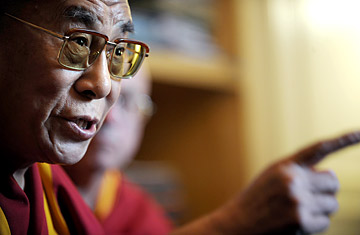
The Dalai Lama.
Fifty years ago today, two mortar shells landed near the Tibetan palace of Tenzin Gyatso, the 14th Dalai Lama. "When the Chinese guns sounded that warning of death, the first thought in the mind of every official within the Palace, and every humble member of the vast concourse around it, was that my life must be saved and I must leave the Palace and leave the city at once," the Dalai Lama recalled in his autobiography about fleeing the Potala Palace disguised as a Tibetan soldier. Since then, His Holiness has become the most recognized face of Tibetan Buddhism from his sanctuary in Dharamsala, India. Read TIME's 1959 cover on "The Escape That Rocked the Reds."
But even with the backing of three U.N. resolutions, the support of global celebrities like Richard Gere and Sharon Stone, and a Nobel Prize in recognition of his efforts, the Dalai Lama has had little luck convincing China to grant Tibet "meaningful autonomy" from the People's Republic. Beijing has accused the Dalai Lama of inciting protests in Tibet and China, and has called him a "liar" and "schemer." And time has done little to heal such diplomatic and cultural wounds. Last week, a day before the 50th anniversary of the failed Tibetan uprising that left 22 dead, the country's prime minister announced that China would only welcome more talks with envoys for the Dalai Lama if the exiled spiritual leader renounced "separatism." The Tibetan prime minister-in-exile responded in kind: "The Chinese premier's allegations ... [are] far from the truth."
Fast Facts:
• The literal translation of "Dalai Lama" is "Ocean Teacher," a term first coined in 1580 by a Mongol chieftan to describe Bsod-nams-rgya-mtsho, an "incarnate lama," or highly advanced spiritual teacher whose wisdom and compassion for the world is said to be reincarnated after death.
• In 1642, the fifth Dalai Lama received temporal control of Tibet; the region remained under the Dalai Lama's rule until the Communist revolution in China, when the nation's new leaders asserted that Tibet was part of the "Chinese motherland."
• When the 14th Dalai Lama was just 2 years old, he was recognized as the reincarnation of the 13th Dalai Lama after oracles and search parties discovered him in a rural town in Tibet. But first, he had to pass a number of tests (including the selection of personal items that had belonged to the 13th Dalai Lama, Thupten Gyatso).
• His Holiness was enthroned on Feb. 22, 1940 after being held for ransom by a powerful Chinese warlord. (The Tibetan government paid the ransom to ensure his release).
• Much of what the Dalai Lama first learned about the outside world came from magazines, newsreels and visits with the Austrian mountaineer Heinrich Harrer, who spent seven years in Tibet.
• In 1954, he embarked on a year-long tour of China, meeting with leader Mao Zedong to lobby on Tibet's behalf. He first visited Europe in 1973 and, six years later, trekked to the U.S. for the first time.
• The 14th Dalai Lama spent only 9 years of his rule in Tibet before escaping to the Himalayas, where the Indian government granted him asylum. More than 90,000 followers have since joined him in exile in Dharamsala, where they have established monasteries and farming communities to preserve a culture that was nearly destroyed during China's decade-long Cultural Revolution, which began in 1966.
• The Dalai Lama is currently the longest-serving ruler on the planet, having led his people for 68 years — longer than Queen Elizabeth II, King Bhumibol Adulyadej of Thailand or even Fidel Castro. Though the question of his successor remains unanswered, the Buddhist monk has asserted that the next Dalai Lama would be discovered outside of China's borders, and has even suggested that Tibetans hold an election to decide whether the spiritual institution should continue after his death.
Quotes about the 14th Dalai Lama
"The Dalai Lama in his struggle for the liberation of Tibet consistently has opposed the use of violence. He has instead advocated peaceful solutions based upon tolerance and mutual respect in order to preserve the historical and cultural heritage of his people."
— The Nobel Committee, on their decision to present the 14th Dalai Lama with the Nobel Peace Prize in 1989 (Boston Globe, Oct. 8, 1989)
"What the international community should concern itself with, and should ask about, is precisely what role and function he played in this serious incident of criminal violence involving fighting, smashing, looting and arson. The one who should be tried and investigated is the Dalai Lama himself."
— Chinese Foreign Ministry Spokesman Qin Gang, on the Dalai Lama's role in the destructive Tibetan protests in China earlier this year (New York Times, Mar. 19, 2008)
Quotes by the 14th Dalai Lama
"This is my simple religion. There is no need for temples; no need for complicated philosophy. Our own brain, our own heart is our temple; the philosophy is kindness."
— On compassion (New York Times, Nov. 28, 1993)
"I am a simple Buddhist monk — no more, no less."
— On himself (New York Times, Oct. 9, 1989)
"Because we all share this small planet Earth, we have to learn to live in harmony and peace with each other and with nature. That is not just a dream,
but a necessity."
— From his Nobel Peace Prize Lecture (NobelPrize.org, Dec. 11, 1989)
"I have been sincerely pursuing the middle way approach in dealing with China for a long time now but there hasn't been any positive response from the Chinese side. As far as I'm concerned, I have given up."
— On the lack of progress regarding discussions with China on autonomy for his homeland (USA Today, Oct. 25, 2008)
"Hell on Earth."
— Describing life under 50 years of Chinese rule during the 50th anniversary of Tibet's failing uprising (AP, Mar. 10, 2009)
